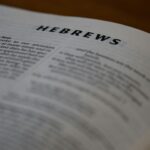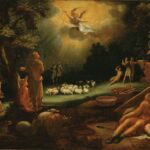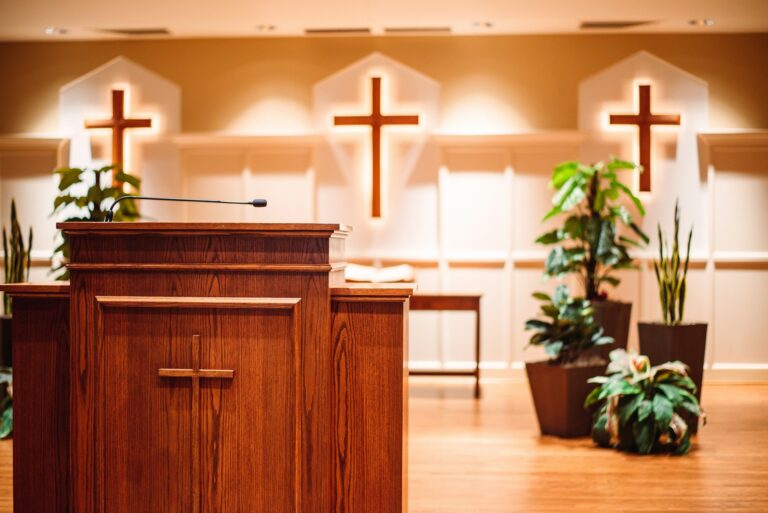On Good Friday we remember the death of Jesus Christ on the cross for us. Christians speak of the death of Jesus so often that it can begin to feel all too normal to us and we can lose the wonder of one of the greatest mysteries of our faith. Hebrews 1:1-4 captures the glorious mystery of Good Friday. We will see the depths of this mystery as we consider what it means that Jesus was “appointed heir of all things” so that he could die for us and be glorified.
In the past God spoke to our ancestors through the prophets at many times and in various ways, but in these last days he has spoken to us by his Son, whom he appointed heir of all things, and through whom also he made the universe. The Son is the radiance of God’s glory and the exact representation of his being, sustaining all things by his powerful word. After he had provided purification for sins, he sat down at the right hand of the Majesty in heaven. So he became as much superior to the angels as the name he has inherited is superior to theirs.
The Mystery of Jesus’ Identity
This passage is one of the most powerful texts in the Bible on the divinity of Jesus. At the heart of these verses we find the core truth of Jesus’ identity. In verse 3 we read that Jesus is “the radiance of God’s glory and the exact representation of his being.” Though he is a distinct person from his Father, he is one with him in being. The phrases immediately before and after that heart in verse 3 add another layer to who Jesus is—his role as Creator and sustainer of the universe. “…and through whom also he made the universe… sustaining all things by his powerful word” (vv. 2–3).
There is yet another layer to be discovered in this passage from Hebrews 1, and it is in this layer that we come to Good Friday. Jesus is the one “whom he [the Father] appointed heir of all things….After he had provided purification for sins, he sat down at the right hand of the Majesty in heaven.” We can clearly see that the author of Hebrews is speaking of what Jesus accomplished on the cross when he says that he “provided purification for sins.” We can also see that he is speaking of Jesus’ ascension to his Father’s right hand when he says “he sat down at the right hand of the Majesty in heaven.” But before we come to these familiar truths, we are faced with the less familiar truth that Jesus was “appointed heir of all things.”
Jesus as the Appointed Heir
What does it mean that Jesus was “appointed heir of all things”? If Jesus is God and one with his Father, and if Jesus created the world, isn’t everything already his? Why would he need to be “appointed heir”? The answer to these questions comes when we remember that Jesus has two natures. As God the Son, all things are his and he did not need to be appointed the heir of all things. This is his divine identity that we find at the heart of Hebrews 1:1-4. But when Jesus came to save us from our sin, he took on a second nature, a human nature. And it was according to his human nature, as the Messiah, that he was appointed the heir of all things.
Later on in Hebrews, the author quotes Psalm 8, a psalm that is marveling over God’s attention to humans and the position of honour he has given us in creation:
It has been testified somewhere, “What is man, that you are mindful of him, or the son of man, that you care for him? You made him for a little while lower than the angels; you have crowned him with glory and honor, putting everything in subjection under his feet.” (Hebrews 2:6–8)
The author of Hebrews picks up on that last phrase, that God has put all things in subjection under mankind, and then comments, “Now in putting everything in subjection to him, he left nothing outside his control. At present, we do not yet see everything in subjection to him.” The reality is not aligned with God’s purpose for humanity, as described in Psalm 8 (and Genesis 1). God made everything for us to reign over as his image-bearers. Creation is a gift for us. And we have utterly failed to live up to this role. Ever since Adam’s first sin, death has reigned (Romans 5:12–14). Our sin has made us slaves of death (Hebrews 2:15) and prevented us from taking our proper place in the cosmos as the viceregents of God.
The Cross and the Kingdom
Hebrews 2 goes on to explain how Jesus is the one who became a human to stand in our place. He is a new Adam (Romans 5:15–17) who not only takes the punishment for our sins (Hebrews 2:17), but fulfills our role as the human who would be glorified over creation (v. 9) as the heir of all things and bring us with him into that glory (v. 10).
We see echoes of this truth all throughout the Bible. In Psalm 2, a messianic psalm pointing forward to Jesus, The Lord God promises to give the whole world to his Messiah as a kingdom for his inheritance:
You are my Son; today I have begotten you. Ask of me, and I will make the nations your heritage, and the ends of the earth your possession. (vv. 7b–8)
In Luke 22, Jesus’ disciples are arguing about who among them was the greatest, their minds full of prideful fantasies of being important. Jesus confronts their pride and tells them they are acting like those who don’t love God. Then he adds, “and I assign to you, as my Father assigned to me, a kingdom, that you may eat and drink at my table in my kingdom and sit on thrones judging the twelve tribes of Israel” (vv. 29–30). He says, don’t fight for position. It is sinful, and it is also unnecessary. I will give you a kingdom to rule over, just as my Father gave one to me.
This kingdom was promised to Jesus as a reward for enduring the shame of the cross. Satan tempted Jesus in the wilderness with a shortcut to the reward in Luke 4:
And the devil took him up and showed him all the kingdoms of the world in a moment of time, and said to him, “To you I will give all this authority and their glory, for it has been delivered to me, and I give it to whom I will. If you, then, will worship me, it will all be yours.” (vv. 5–7).
Like the liar he is, Satan offered Jesus his inheritance without the cross. The temptation was the glory without the shame of death and the penalty of our sins. But Jesus did not give in to Satan’s temptation. Rather, he “humbled himself by becoming obedient to death—even death on a cross!” (Philippians 2:8). And so on the cross, he “provided purification for sins” (Hebrews 1:3), taking our place, and delivering us from the slavery to which we had subjected ourselves. On the third day he rose again, and shortly thereafter, he ascended to his Father’s right hand and “he sat down at the right hand of the Majesty in heaven.”
This is all part of his role as the Messiah, the heir of all things, the Saviour of the world, the perfect human. As God the Son, the throne of his Father is his throne. But in his human nature, he is sitting in our place reigning over creation as God’s vice-regent until the day he returns to receive his full inheritance and make all things new. It is as a human, in his mission, that Jesus “humbled himself by becoming obedient to death” and as a human, in his mission, that:
God exalted him to the highest place and gave him the name that is above every name, that at the name of Jesus every knee should bow, in heaven and on earth and under the earth, and every tongue acknowledge that Jesus Christ is Lord, to the glory of God the Father. (Philippians 2:8–11)
After his mission is finished, Jesus, as the human messiah and the last Adam, will deliver “the kingdom to God the Father” (1 Corinthians 15:24). As the human Messiah, he “himself will also be subjected” to his Father, while in his divine nature, he remains one with his Father and the Holy Spirit, so that “God may be all in all” (v. 28).
So this Good Friday, don’t let the death of Jesus become common to you. Remember the deep mystery of Jesus who became one of us and as the heir of all things, redeemed us from our sins and brought us to his glory!
























